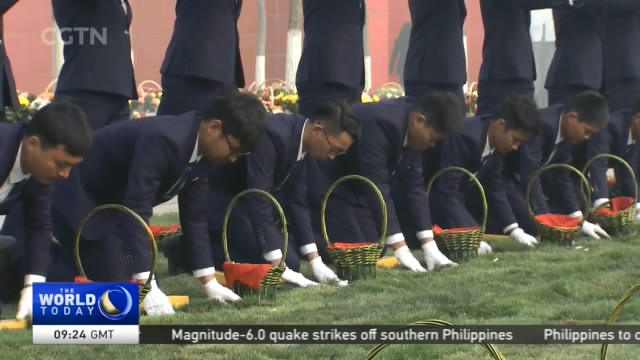
18:41, 05-Apr-2018
Tomb Sweeping Day: More Chinese families now opting for 'green burials'

It's not uncommon to see large crowds of people in China's cemeteries during this week's Qingming Festival, as they pay their respects to their ancestors by tidying up their final resting place. However, this year, instead of bringing offerings and burning incense, many families have chosen to move away from tradition. CGTN's Ren Xueqian explains.
For many Chinese families, the Tomb Sweeping Festival is a time to honor their late relatives with strict rituals. But here, at a cemetery in northeast China's Tianjin, Li Shujuan and her family aren't just looking to uphold these traditions, they're laying to rest Shujuan's late aunt, but in a way which doesn't necessarily meet with convention.
REN XUEQIAN TIANJIN "With the government looking to optimize land use through policies such as eco-friendly cemeteries, more Chinese families are now choosing "green burial" in preference to the more traditional customs and practices, which were seen as the only way to properly pay respect to the deceased."
With China's huge population, space is at a premium in many urban areas, so these "green-" or "eco-burials" dissolve the need for a portion of precious land.
Instead, they involve the spreading the ashes of the deceased into the sea, or placing them into biodegradable urns and burying them in a special place, such as near trees or flowers. Both ways carry fewer overheads and formalities compared with traditional Chinese burial ceremonies, which usually include lengthy rituals.
LI SHUJUAN TIANJIN RESIDENT "I think formalities and rituals are just ways for the living to cope. Green burials allow the deceased to really become one with nature. It's also cost-efficient. The cost of one traditional grave has now increased from nearly 20-thousand yuan to 50-thousand yuan."
Yong'an Cemetery, one of Tianjin's biggest, is offering free green-burials every spring for families who are ready to make the switch.
XIA YONGXIANG VICE PRESIDENT, TIANJIN YONGAN GROUP "Since 2010, we've had 3,700 green burials and the number is increasing. Green burials do not require a tombstone, they allow for the reuse of land, and can provide a proper burial for those without a family."
However, green-burials mean families are giving up that one special place where they can honor their ancestors, something which becomes ever more poignant on anniversaries and this week's Tomb Sweeping Festival. But Li Shujuan's says her aunt will never be forgotten despite the absence of a headstone.
LI SHUJUAN TIANJIN RESIDENT "Qingming is the biggest event after Chinese New Year, and weighs heavily on my mind, that sometimes these customs feel like a burden. But now, even without a traditional grave, memories of my aunt will still live on in my heart."
Though green burials are still a relatively new concept in China, more and more people are taking a pragmatic approach, and looking at the bigger picture.
TIANJIN RESIDENT "My late father and mother in law supported green burial and thought it can help conserve land."
TIANJIN RESIDENT "People's awareness has improved, now there are fewer people burning firecrackers and less smoke and pollution, I'm in support of such changes."
According to Chinese Ministry of Civil Affairs, the government is hoping for a huge shift towards green burials in the coming years, as they expect the country's traditional cemeteries will be full by 2022. RXQ, CGTN

SITEMAP
Copyright © 2018 CGTN. Beijing ICP prepared NO.16065310-3
Copyright © 2018 CGTN. Beijing ICP prepared NO.16065310-3